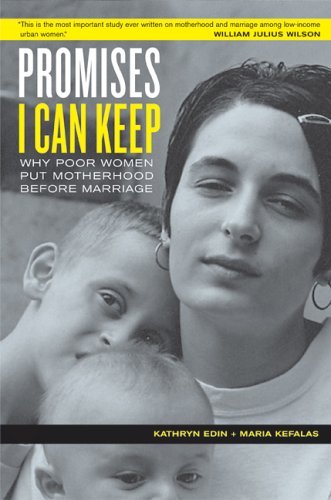What do you think?
Rate this book


Over a span of five years, sociologists Kathryn Edin and Maria Kefalas talked in-depth with 162 low-income single moms like Millie to learn how they think about marriage and family. Promises I Can Keep offers an intimate look at what marriage and motherhood mean to these women and provides the most extensive on-the-ground study to date of why they put children before marriage despite the daunting challenges they know lie ahead.
Read an excerpt here:
Promises I Can Keep: Why Poor Women Put Motherhood before Marriage, With a New Prefaceby Kathryn Edin and M... by University of California Press
298 pages, Paperback
First published January 1, 2005